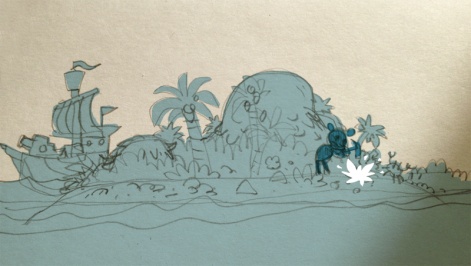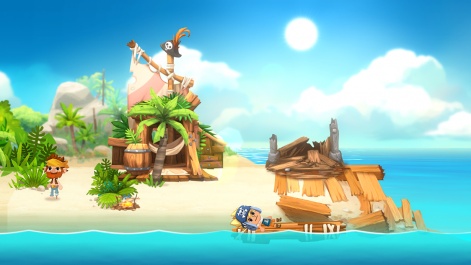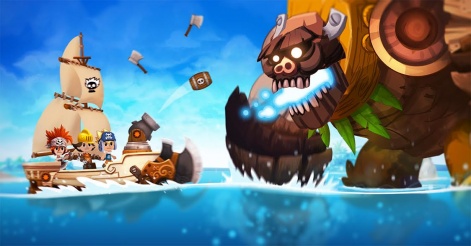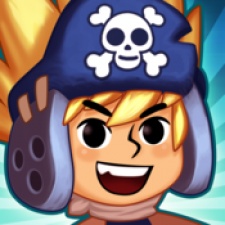From playing Pirate Power, a recently-launched RPG from French studio Godzilab, you probably wouldn't guess that the bulk of it was developed by just two people.
Boasting a bright and distinctive visual style, reams of dialogue and a robust PvP multiplayer component, it was a mammoth 3-year undertaking for the diminutive team and undoubtedly the studio's most ambitious game yet.
To learn more about the vision that fuelled Pirate Power, challenges faced during development and how the game has been faring since launch we reached out to Godzilab co-founders Jerome Lanquetot and Thomas Lachartre.
PocketGamer.biz: Pirate Power takes much more of a plot-based approach than your average F2P game, with plenty of dialogue. What was your thinking in regards to this?
Thomas Lachartre: It's kind of an homage to the games we grew up on, like the Final Fantasy or Monkey Island series.
Games in which story and characters add a lot to the game experience.
In Happy Street, our previous game we already developed a world with lots of unique characters, each of them having their own quirks and anecdotes.
It's an homage to the games we grew up on, like Final Fantasy and Monkey Island.Thomas Lachartre
This led us to grow a fun and lively world that touched many of our players. That's why we kind of doubled down with Pirate Power and created an overarching story with plenty of cool characters on top of the naval battle gameplay.
The game has a very distinct visual style - what were your inspirations?
TL: It was inspired by a number of styles, including [Hayao] Miyazaki, [Marc] Boutavant, classic Disney, and [Akira] Toriyama. Also...
Godzilab appears to be developing a signature style across its portfolio - bright, vibrant visuals and light-hearted dialogue. Is this intentional, and is it something you're likely to continue?
TL: It depends on the project really. We pick a visual universe which we feel as appropriate for the type of game we are making.
There is no will to define a very precise style that we would be infused in every project.
At the same time, I am the only one handling the style from mockups to final assets, so for sure there is a lot of my style across the board in Godzilab games.


How many worked on the game, and what was the total dev time? (Not including ongoing updates, etc.)
Jerome Lanquetot: The core of the team is 2 people, and we have 2 other team members helping us in between the updates for Happy Street.
We have been working on it for almost 3 years now, which is a lot, especially compared to our previous projects which had an average dev time of 6 months.
As a studio that's developed both premium and free-to-play games, was there ever any question as to how Pirate Power would monetise? Can you ever see yourself returning to premium?
We would go back to premium, but freemium is the only way to survive.Jerome Lanquetot
JL: If we had the choice we would go back to premium but in this market, freemium is the only way to survive.
We actually went back to premium back in 2011 after working on Stardunk which was freemium, hoping that it could work.
We released iBlast Moki 2 as a premium title, but even though the press praised it - with a metacritic of 93 and Game Of the Week on the App Store - it still did far less revenue than Stardunk.
How did you come up with - and develop - your monetisation strategy?
JL: We are playing a lot of different games mobile or console, as well as Japanese/Korean games.
They are in advance compared to the western world regarding a lot of aspects.
In particular, Asian games are really strong in keeping their games alive with events. We regularly do events with Happy Street releasing themes every month or two, but having hourly, daily and weekly events is a completely new level for us.

The energy system is definitely the most controversial system, and honestly we were not big fans of it at the beginning, but it appears that it’s really good for the game.
Not only for monetisation, but mostly for retention - those who play short sessions a few times a day tend to stick longer with the game than those who play non-stop for several hours a day.
Luke Muscat [ex-Halfbrick, now with Prettygood Games] actually had a great analogy: imagine having a chocolate cake to eat. If you eat half of it in one go you will be sick and you are not going to eat the rest of the cake.
Whereas if you get one slice every day, you will probably end up eating the whole cake.
What do you think was the biggest challenge you overcame during development?
Everybody is working remotely, so staying motivated for 3 years was definitely a challenge.Jerome Lanquetot
JL: The length of the project for sure.
Everybody is working remotely so staying motivated and working rigorously on Pirate Power for 3 years was definitely a challenge but we made it.
As a developer who self-publishes, what's your approach to collecting player data?
JL: We are getting better with this last one, especially on the UA side we have now the tools in place to measure our main KPI and make sure our acquisition channels are profitable.
Surprisingly, we are getting different numbers from the soft launch, mostly because our users are mainly organics while in soft launched they were mostly paid.
Our conversion has been really good - 10% of the players are buying IAP and retention is above 20% for day 7.
What's the next step for Pirate Power - any big updates in the works?
JL: We are working on adding new content especially with the story line, more missions variety, guilds and creating new events.
Any plans for a Google Play release? If so, when do you see this happening?
JL: Yes, that’s our main focus right now and hoping to release it in a few weeks.
You can download Pirate Power for free on the App Store.






















